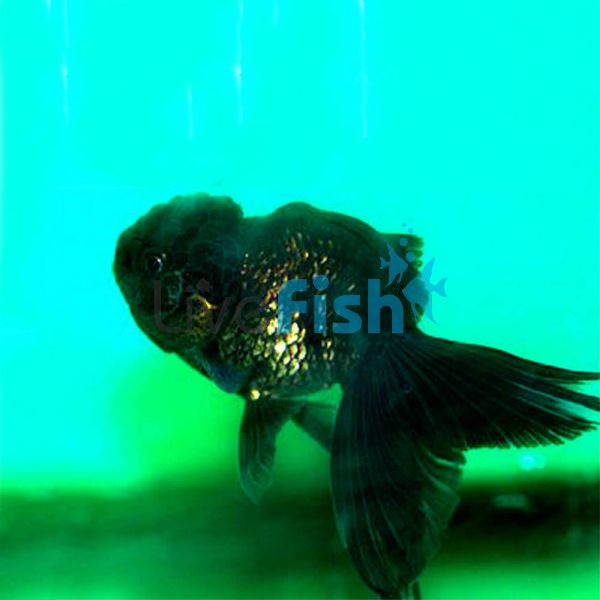Black & Bronze Oranda 9cm
Oranda would have to be one of the most popular strains of fancy goldfish, their endless colours, comical look, and elegant fins make them a fish that aquarists will often dedicate their entire hobby to keep. Whilst Oranda tends to have quite bright colours, through selective breeding the black and bronze oranda offers a unique dark look to these fish. These fish will be a great addition to a mixed orange tank to really add some shimmer and contrast.
Black & Bronze Oranda
Oranda would have to be one of the most popular strains of fancy goldfish, their endless colours, comical look, and elegant fins make them a fish that aquarists will often dedicate their entire hobby to keep. Whilst Oranda tends to have quite bright colours, through selective breeding the black and bronze oranda offers a unique dark look to these fish. These fish will be a great addition to a mixed orange tank to really add some shimmer and contrast.
These near full-grown, orandas are large fish that have essentially developed their full adult colours. This is especially unique because not only in orandas but goldfish in general the darker pigmentation tends to fade as the fish mature through a process called demonization. This means that it is highly unlikely for this oranda to change colours in the future which leaves you with a stunning, dark fish. The predominant colour on this fish is the jet black that runs from head to tail however these oranda do sport a lot of bronze scales, especially through the belly area. These reflective scales really catch light well and create a glittering effect in the aquarium.
Whilst goldfish are cold water tolerant and can be kept in outdoor ponds, it is better to keep oranda goldfish indoors. These fish are not the best swimmers and are bred in tropical countries, they may not be able to hide swiftly from predators outdoors or even tolerate the near-freezing temperatures that comet goldfish can live in. Breeding these fish in captivity however is possible, sexing these goldfish is a difficult task however once males and females reach maturity, they can show some chasing behaviours. Females may also appear to be larger when filled with eggs and have clear cheek plates whereas males tend to develop star-shaped bumps.
Tank Recommendations for Black and Bronze Oranda
The black and bronze oranda goldfish can get fairly big at 15 cm both in length and height meaning that an individual fish would need a minimum volume of 120 liters. A larger aquarium is always better because what is better than one personable and adorable black and bronze oranda goldfish? Two black and bronze oranda goldfish of course!
The thing to note however with black and bronze oranda goldfish is that, due to their compact body and short fins, they are actually not the best swimmers so a slower flow is better. A sand substrate is good as these fish will sift through the substrate in search of food however, they can thrive in a bare-bottom system. Smooth river stones can be added for further decoration however sharp materials should be avoided in the aquarium like pointy driftwood as black and bronze oranda goldfish can easily get injured by them.
Suitable Tank Buddies
black and bronze oranda are peaceful species and can be kept with many different tank mates. It is best to keep them with smaller, nonaggressive, or fin-nipping species.
Usually Compatible
Medaka icefish, paradise fish, giant danios, zebra danio, White Cloud Mountain minnows
Sometimes Compatible
Species can be fin nippers like rosy barbs and also tropical fish such as angelfish, dwarf cichlids, mollies, and other higher temperature-loving fish.
Rarely Compatible
Larger cichlids and fish that have a mouth large such as Oscars, jaguar cichlids, and shrimp should also be avoided as black and bronze oranda goldfish would eat shrimp in an instant.
Feeding your Black and Bronze Oranda
Feeding black and bronze oranda should be a breeze, they should immediately take to any aquarium food practically within 24 hours of being added to their new home. Having other goldfish as well will really boost their confidence during feeding time. Slow-sinking foods would be best as these rounder strains have been known to at times get swim bladder issues after frantically gulping for food at the surface. Good quality pellets or flakes which are rich in algae or spirulina content are best to suit their herbivorous diet.
Plant safe?
No - however rough leafed plants like Anubias may be okay.
| Scientific Name | Carassius auratus |
|---|---|
| Care Level | Easy |
| Common Names | black and bronze oranda |
| Diet | Herbivore |
| Fish Family | Cyprinidae |
| Lifespan (years) | 15 |
| Max. Length (cm) | 15 |
| Min. Tank Volume (l) | 120 |
| Origin | Asia |
| Reef Safe | No |
| Sociability | Peaceful |
| Venomous | No |
| Water Conditions | 18 - 26° C, pH 7.0 - 8.5 |




